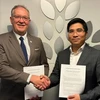Vietnam pledges to implement measures to accelerate cooperation in energy sector at the Energy Summit in Singapore on October 28.
Le Tuan Phong, Deputy Director General of the General Directorate of Energy under the Vietnam Ministry of Investment and Trade, made the commitment which includes improving business and investment climate, upgrading infrastructures and harmonising technical standards to facilitate cooperation and connectivity, and establishing mechanisms of technology transfer, information and experience exchange.
Vietnam will facilitate and promoting bilateral and multilateral dialogues and cooperation among energy producing, transit and consuming countries; and promoting regional and national initiatives forwards energy security enhancement and sustainable use of energy, he added.
In his speech on Vietnam’s energy development strategy and proposals for international cooperation, the Vietnamese head delegate said that the country’s National Energy Development Strategy up to year 2020 and vision to 2050 has put forward a number of objectives, including ensuring national security and sufficient supply of energy to socio-economic development; diversifying energy sources; intensively developing renewable energy sources and nuclear energy as well as bio-fuels to meet socio-economic development demand; and efficiently and sustainably developing energy sector in parallel with environmental protection.
According to the Deputy Director General, Vietnam’s energy demand is forecasted to increase at about 7 percent per annum in the 2010-2020 period and about 5 percent per annum in the period from 2020 to 2030. To meet the continuously growing demand, Vietnam should exploit about 19 billion cubic metres of gas per year in the 2015-2025 period; to put into commission the first nuclear power unit of 1,000 MW by 2020, to raise nuclear power capacity to 4,000 MW by 2025 and 15,000 MW by 2030; as well as to raise renewable energy account of 5 percent by 2020 and 8 percent by 2030 in national power capacity.
Also on the same day, Singapore inked two Memorandums of Understanding (MoU) with Cambodia and the United Arab Emirates (UAE) to strengthen partnerships in the energy sector.
The MoUs will provide formal frameworks for information exchange and sharing of experiences between Singapore and the two countries in areas such as energy efficiency and conservation, regulation of electricity, renewable energy and liquefied natural gas (LNG). The agreements will also facilitate collaboration among private sector players to explore opportunities in the energy sector.
The first project under the Singapore-Cambodia MoU will involve the training of 60 Cambodian energy officials in electrical safety systems, frameworks and regulations.
All the above events took place during the International Energy Week held in Singapore from October 28 to November 1.-VNA
Le Tuan Phong, Deputy Director General of the General Directorate of Energy under the Vietnam Ministry of Investment and Trade, made the commitment which includes improving business and investment climate, upgrading infrastructures and harmonising technical standards to facilitate cooperation and connectivity, and establishing mechanisms of technology transfer, information and experience exchange.
Vietnam will facilitate and promoting bilateral and multilateral dialogues and cooperation among energy producing, transit and consuming countries; and promoting regional and national initiatives forwards energy security enhancement and sustainable use of energy, he added.
In his speech on Vietnam’s energy development strategy and proposals for international cooperation, the Vietnamese head delegate said that the country’s National Energy Development Strategy up to year 2020 and vision to 2050 has put forward a number of objectives, including ensuring national security and sufficient supply of energy to socio-economic development; diversifying energy sources; intensively developing renewable energy sources and nuclear energy as well as bio-fuels to meet socio-economic development demand; and efficiently and sustainably developing energy sector in parallel with environmental protection.
According to the Deputy Director General, Vietnam’s energy demand is forecasted to increase at about 7 percent per annum in the 2010-2020 period and about 5 percent per annum in the period from 2020 to 2030. To meet the continuously growing demand, Vietnam should exploit about 19 billion cubic metres of gas per year in the 2015-2025 period; to put into commission the first nuclear power unit of 1,000 MW by 2020, to raise nuclear power capacity to 4,000 MW by 2025 and 15,000 MW by 2030; as well as to raise renewable energy account of 5 percent by 2020 and 8 percent by 2030 in national power capacity.
Also on the same day, Singapore inked two Memorandums of Understanding (MoU) with Cambodia and the United Arab Emirates (UAE) to strengthen partnerships in the energy sector.
The MoUs will provide formal frameworks for information exchange and sharing of experiences between Singapore and the two countries in areas such as energy efficiency and conservation, regulation of electricity, renewable energy and liquefied natural gas (LNG). The agreements will also facilitate collaboration among private sector players to explore opportunities in the energy sector.
The first project under the Singapore-Cambodia MoU will involve the training of 60 Cambodian energy officials in electrical safety systems, frameworks and regulations.
All the above events took place during the International Energy Week held in Singapore from October 28 to November 1.-VNA



















